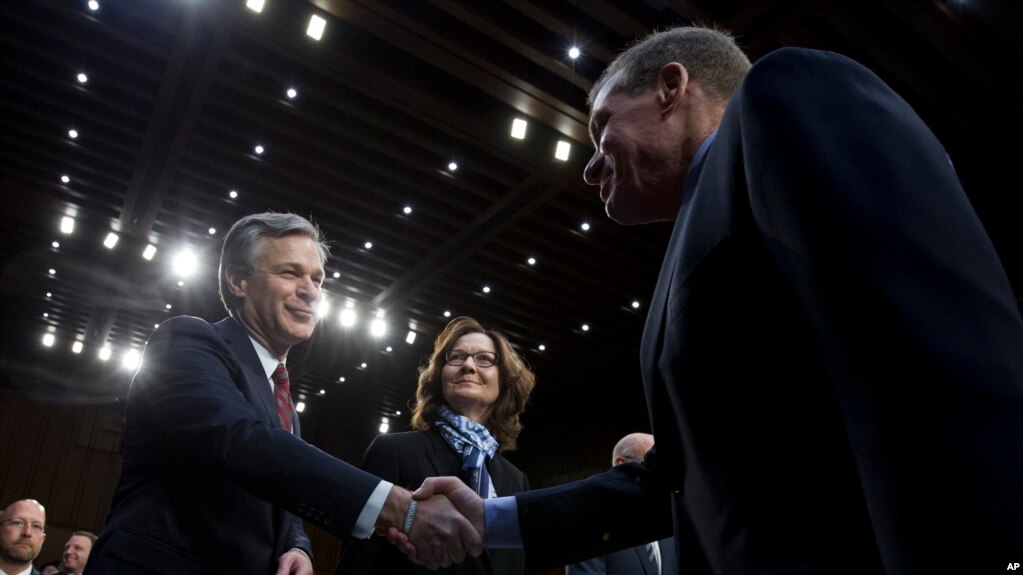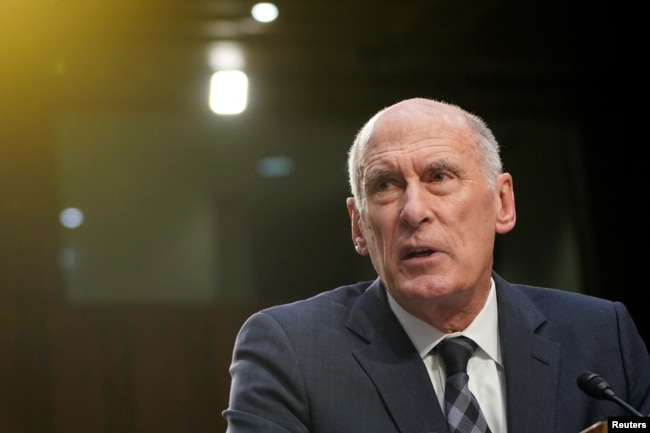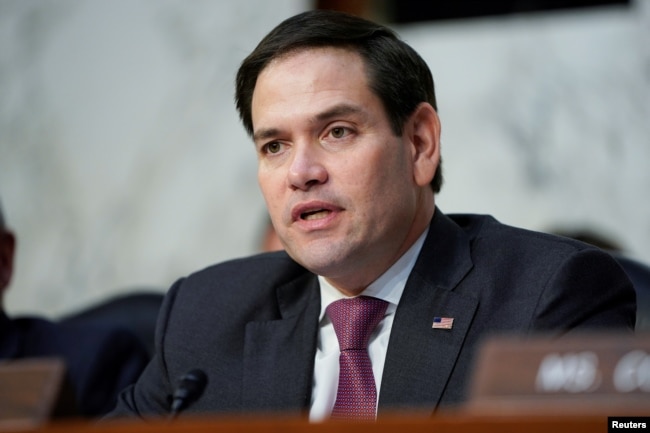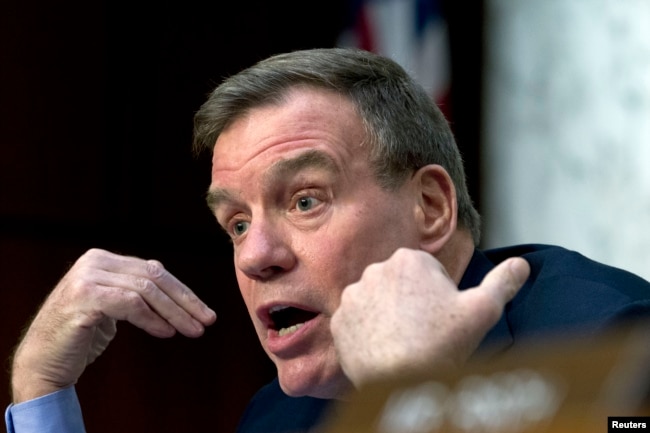 Senate Intelligence Committee Vice Chairman Mark Warner, D-Va., shake hands with FBI Director Christopher Wray as CIA Director Gina Haspel looks on before the Senate Intelligence Committee hearing on Capitol Hill in Washington, Jan. 29, 2019.
Senate Intelligence Committee Vice Chairman Mark Warner, D-Va., shake hands with FBI Director Christopher Wray as CIA Director Gina Haspel looks on before the Senate Intelligence Committee hearing on Capitol Hill in Washington, Jan. 29, 2019.Senior U.S. officials and experts say the United States needs to rally allies to pressure China stealing advanced technology through cyber espionage.
At the same time, key American lawmakers are questioning the readiness and capacity of the U.S. to counter such threats.
The renewed push comes after U.S. federal prosecutors pressed criminal charges against the world's largest telecommunications company — China's Huawei Technologies — its chief financial officer and several subsidiaries for financial fraud and theft of U.S. intellectual property.
The renewed push comes after U.S. federal prosecutors pressed criminal charges against the world's largest telecommunications company — China's Huawei Technologies — its chief financial officer and several subsidiaries for financial fraud and theft of U.S. intellectual property.
The Trump administration said Washington is deeply concerned about the potential of Beijing using Chinese technology firms to spy on the U.S. and its allies.
 Director of National Intelligence Dan Coats testifies to the Senate Intelligence Committee hearing about worldwide threats on Capitol Hill in Washington, U.S., Jan. 29, 2019.
Director of National Intelligence Dan Coats testifies to the Senate Intelligence Committee hearing about worldwide threats on Capitol Hill in Washington, U.S., Jan. 29, 2019.
"China's pursuit of intellectual property, sensitive research and development plans, and the U.S. person data remains a significant threat to the United States government and the private sector," Director of National Intelligence Dan Coats told lawmakers at a Senate Select Committee on Intelligence hearing on Tuesday.
Other officials, including Assistant Secretary of State for International Security and Non-proliferation Christopher Ford, advocate for a global coalition against Chinese technology-transfer threats.
At another hearing, experts said threats that Huawei poses to supply chains and critical infrastructure are absolutely real.
"We need defensive measures and we need to invest in our own technologies as well, and we need to be cooperating with allies and partners," said Ely Ratner, who was deputy national security advisor to former Vice President Joe Biden.
"We know that the Huawei leadership has members of the Communist Party within it, and the company has a long and deep relationship with both PLA and the Ministry of State Security in China. And of course is subject to Chinese law and their new National Intelligence law which gives the government the right to use the networks and data as they wish," added Ratner at a Senate Armed Service Committee hearing.
Former Deputy Assistant Secretary of Defense Elbridge Colby warned that China may gain "economic, informational, and blackmail" leverage over other countries through data collected by companies such as Huawei.
"This dissolves or corrodes the resolve in these countries potentially to stand up to Chinese potential coercion," Colby told senators.
"We need to be able to form a network that is sufficient and cohesive to stand up to these Chinese threats," he added.
Bipartisan senators have been pushing for the creation of a White House office to fight China's state-sponsored technology theft and defend critical supply chains.
 Senator Marco Rubio questions witnesses before the Senate Intelligence Committee hearing about "worldwide threats" on Capitol Hill in Washington, Jan. 29, 2019.
Senator Marco Rubio questions witnesses before the Senate Intelligence Committee hearing about "worldwide threats" on Capitol Hill in Washington, Jan. 29, 2019.
"China is currently attempting to achieve technological and economic superiority over the United States through the aggressive use of state-directed or state-supported technology transfers," said Senator Mark Warner (D-VA) and Senator Marco Rubio (R-FL) who introduced a bill to fight China's technology threats earlier this month.
"A national response to combat these threats and ensure our national security has, to date, been hampered by insufficient coordination at the federal level," added Warner and Rubio in a statement.
 Senate Intelligence Committee Vice Chairman Mark Warner, D-Va., speaks during the Senate Intelligence Committee hearing on Capitol Hill in Washington, Jan. 29, 2019.
Senate Intelligence Committee Vice Chairman Mark Warner, D-Va., speaks during the Senate Intelligence Committee hearing on Capitol Hill in Washington, Jan. 29, 2019.
Under the bill, the Office of Critical Technologies & Security would coordinate with federal and state regulators, the private sector, experts and U.S. allies to ensure that every available tool is being utilized to safeguard the supply chain and protect emerging dual-use technologies.
 Director of National Intelligence Dan Coats testifies to the Senate Intelligence Committee hearing about worldwide threats on Capitol Hill in Washington, U.S., Jan. 29, 2019.
Director of National Intelligence Dan Coats testifies to the Senate Intelligence Committee hearing about worldwide threats on Capitol Hill in Washington, U.S., Jan. 29, 2019."China's pursuit of intellectual property, sensitive research and development plans, and the U.S. person data remains a significant threat to the United States government and the private sector," Director of National Intelligence Dan Coats told lawmakers at a Senate Select Committee on Intelligence hearing on Tuesday.
Other officials, including Assistant Secretary of State for International Security and Non-proliferation Christopher Ford, advocate for a global coalition against Chinese technology-transfer threats.
At another hearing, experts said threats that Huawei poses to supply chains and critical infrastructure are absolutely real.
"We need defensive measures and we need to invest in our own technologies as well, and we need to be cooperating with allies and partners," said Ely Ratner, who was deputy national security advisor to former Vice President Joe Biden.
"We know that the Huawei leadership has members of the Communist Party within it, and the company has a long and deep relationship with both PLA and the Ministry of State Security in China. And of course is subject to Chinese law and their new National Intelligence law which gives the government the right to use the networks and data as they wish," added Ratner at a Senate Armed Service Committee hearing.
Former Deputy Assistant Secretary of Defense Elbridge Colby warned that China may gain "economic, informational, and blackmail" leverage over other countries through data collected by companies such as Huawei.
"This dissolves or corrodes the resolve in these countries potentially to stand up to Chinese potential coercion," Colby told senators.
"We need to be able to form a network that is sufficient and cohesive to stand up to these Chinese threats," he added.
Bipartisan senators have been pushing for the creation of a White House office to fight China's state-sponsored technology theft and defend critical supply chains.
 Senator Marco Rubio questions witnesses before the Senate Intelligence Committee hearing about "worldwide threats" on Capitol Hill in Washington, Jan. 29, 2019.
Senator Marco Rubio questions witnesses before the Senate Intelligence Committee hearing about "worldwide threats" on Capitol Hill in Washington, Jan. 29, 2019."China is currently attempting to achieve technological and economic superiority over the United States through the aggressive use of state-directed or state-supported technology transfers," said Senator Mark Warner (D-VA) and Senator Marco Rubio (R-FL) who introduced a bill to fight China's technology threats earlier this month.
"A national response to combat these threats and ensure our national security has, to date, been hampered by insufficient coordination at the federal level," added Warner and Rubio in a statement.
 Senate Intelligence Committee Vice Chairman Mark Warner, D-Va., speaks during the Senate Intelligence Committee hearing on Capitol Hill in Washington, Jan. 29, 2019.
Senate Intelligence Committee Vice Chairman Mark Warner, D-Va., speaks during the Senate Intelligence Committee hearing on Capitol Hill in Washington, Jan. 29, 2019.Under the bill, the Office of Critical Technologies & Security would coordinate with federal and state regulators, the private sector, experts and U.S. allies to ensure that every available tool is being utilized to safeguard the supply chain and protect emerging dual-use technologies.
